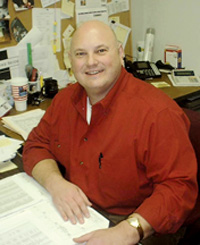LARGO VISTA, Texas - The National Registry of Rehabilitation Technology Suppliers named one of the first individuals to earn its stamp of approval as the new president for 2005-07. Mike Seidel, a certified rehab technology supplier since the early 1990s and a branch manager for National Seating & Mobility, took the helm in August. He replaces Dap Lipka, who remains the organization's past president. Seidel spoke with HME News in late September to talk about his new position and the state of the rehab industry.
HME: In what kind of shape do you inherit the NRRTS throne?
Seidel: Past President Dan Lipka has been very involved on a political scale with funding sources and different organizations, and he has been an excellent mentor. We're entering this new reign of NRRTS. In the past, NRRTS has not taken a very active political stance. In Dan's term and through the encouragement of the board, we've taken more of a political stance, as much as we can for an organization like us.
HME: How do you expect the organization to change shape in the next two years?
Seidel: NRRTS is actually looking at growth. We're looking at: Is it time to hire an executive director or a government relations person to help lead us into the political arena to help formulate policies and changes for our registrants? We also need to refocus on what NRRTS was established for. NRRTS is truly the only organization that's there for the rehab technology supplier - the individual.
HME: What has made it difficult to keep that focus?
Seidel: With changes in Medicare policies, we get sidetracked into are we a political lobbying group for the industry? Or are we an organization here for the individual person? It's a fine line, because they both go hand and hand. I view NCART as for the industry, and NRRTS as for the individual.
HME: What are your goals for NRRTS?
Seidel: We need to develop a standardized evaluation that every CRTS should adhere to - something that says these are the components of the evaluation of a CRTS. If you look at other allied healthcare professions, they have standardized clinical practice guidelines. The other thing that NRRTS should do, and can do, is work as a policing agency for our industry.
HME: How would NRRTS police the industry?
Seidel: Currently, NRRTS can only police their registrants to adhere to standards of practice and a code of ethics. I would like to see a mechanism for NRRTS to log complaints against non-registrants and track that. I think we need to do a better job of policing our own industry, whether you're a NRRTS registrant or not, to justify the need for changes policy wise.
HME: Speaking of changes, what do you think about the proposed new documentation requirements and codes?
Seidel: We can't say, 'We'll survive; we've survived in the past,' because there are people dropping out there. We can't take the attitude that someone is looking out for our best interest; we'll still be in business. The point is are there going to be qualified suppliers able to provide quality equipment based on some of the guidelines being implemented?
HME: If it were up to you, how would you deal with documentation?
Seidel: Where the hang up comes is the documentation required of the physician. I've actually had several physicians just look at me and say, "We won't be prescribing many wheelchairs, if this is what we have to do." That's a message that needs to get back to CMS. Most physicians that I visit with feel that if I refer to a PT or OT to do a functional assessment of the patient, that's the avenue they should take. Most physicians aren't documenting the functional limitations of the client; they're addressing medical issues. Physicians are more comfortable with the past Medicare guidelines of referring out for that. Now we've changed all that, and we're relying on progress notes. We're going to have a documentation issue.
HME: Of all that's going on, what's the greatest challenge that rehab providers face in the coming year?
Seidel: Funding. There's a need for what we do; I think CMS is starting to see that. But the need for the CRTS needs to be more of a priority, because you do see better outcomes working with a certified rehab tech supplier, as evidenced by the majority of higher-end therapists in rehab facilities using CRTSs.




Comments